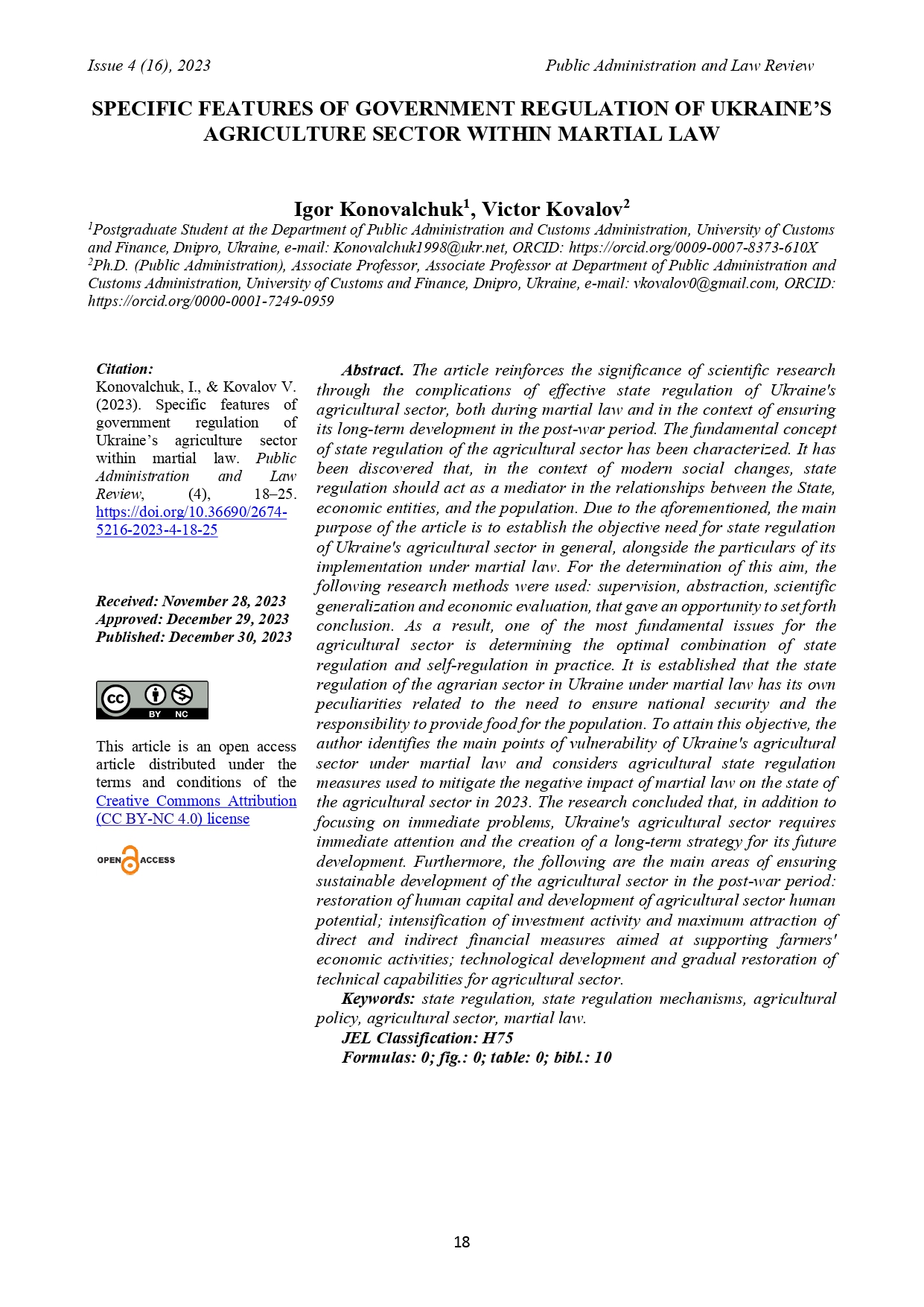SPECIFIC FEATURES OF GOVERNMENT REGULATION OF UKRAINE’S AGRICULTURE SECTOR WITHIN MARTIAL LAW
DOI:
https://doi.org/10.36690/2674-5216-2023-4-18-25Keywords:
state regulation, state regulation mechanisms, agricultural policy, agricultural sector, martial lawAbstract
The article reinforces the significance of scientific research through the complications of effective state regulation of Ukraine's agricultural sector, both during martial law and in the context of ensuring its long-term development in the post-war period. The fundamental concept of state regulation of the agricultural sector has been characterized. It has been discovered that, in the context of modern social changes, state regulation should act as a mediator in the relationships between the State, economic entities, and the population. Due to the aforementioned, the main purpose of the article is to establish the objective need for state regulation of Ukraine's agricultural sector in general, alongside the particulars of its implementation under martial law. For the determination of this aim, the following research methods were used: supervision, abstraction, scientific generalization and economic evaluation, that gave an opportunity to set forth conclusion. As a result, one of the most fundamental issues for the agricultural sector is determining the optimal combination of state regulation and self-regulation in practice. It is established that the state regulation of the agrarian sector in Ukraine under martial law has its own peculiarities related to the need to ensure national security and the responsibility to provide food for the population. To attain this objective, the author identifies the main points of vulnerability of Ukraine's agricultural sector under martial law and considers agricultural state regulation measures used to mitigate the negative impact of martial law on the state of the agricultural sector in 2023. The research concluded that, in addition to focusing on immediate problems, Ukraine's agricultural sector requires immediate attention and the creation of a long-term strategy for its future development. Furthermore, the following are the main areas of ensuring sustainable development of the agricultural sector in the post-war period: restoration of human capital and development of agricultural sector human potential; intensification of investment activity and maximum attraction of direct and indirect financial measures aimed at supporting farmers' economic activities; technological development and gradual restoration of technical capabilities for agricultural sector.
Downloads
References
Berezivskyy Z., Berezivska O. (2023). State regulation of the grain market in Ukraine. Grail of Science. 28. 42 – 47. https://doi.org/10.36074/grail-of-science. 09.06.2023.04
Neuter R. (2022). Losses of $40 billion: how the agrarian sector of Ukraine suffers because of the war. Economic truth. December 19. URL: https://www.epravda.com.ua/columns/2022/12/19/695167/
The project on the calculation of damages and losses in the agroindustrial complex with the aim of informing the general public and policymakers about compensation needs and recovery. URL: http://kse.ua/ua/oglyad-zbitkiv-ta-vtrat-v-apk/
Radchenko O., Pashchenko O., Matveyeva M., Zelenskyi A., & Zaika O. (2022). State financial regulation of the competitive environment: assessment for the agricultural sector of Ukraine. Independent Journal of Management & Production. 13 (3). 310 – 328. https://doi.org/10.14807/ijmp.v13i3.1981.
Pasemko G., Taran O. (2022). State regulation of the agricultural sector during the war (on the example of the Kharkiv region). Economy and society. 51. https://doi.org/10.32782/2524-0072/2023-51-36
Dziurakh Y., Halanets V., Kulakovska T., Pugachov M., & Pugachov V. (2022). Economic assessment and state regulation of the agri-industrial sector in Ukraine: solutions for ensuring food security (modeling and analysis). Economic Affairs. 67 (4). 777 – 786. https://doi.org/10.46852/0424-2513.4s.2022.11
Svistun L. A., Popova Yu. M., Shtepenko K. P. (2020). State regulation of the agrarian sector of the economy in the context of ensuring the tasks of sustainable development. Efficient economy. 11. https://doi.org/10.32702/2307 -2105-2020.11.93
Kopytko V., Kopytko O. (2023). Increasing the effectiveness of state regulation of the agrarian sector of the agricultural sector in the war and post-war period. Economy and society. 52. https://doi.org/10.32782/2524-0072/2023-52-35
Vdovenko L. (2022). Instruments of state financial support of the agricultural sector in the conditions of martial law. Economy and society. https://doi.org/10.32782/2524-0072/2022-44-82
Projects of the national program "Development of economic sectors with added value". URL: https://recovery.gov.ua/project/program/grow-value-adding -sectors-of-economy.

Downloads
Published
How to Cite
Issue
Section
License

This work is licensed under a Creative Commons Attribution-NoDerivatives 4.0 International License.





